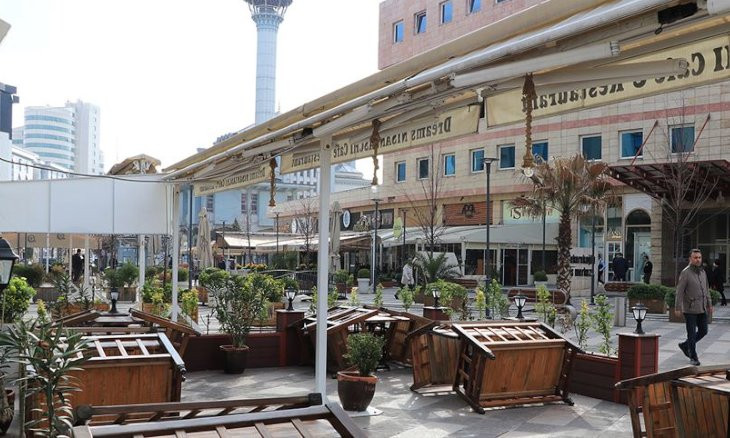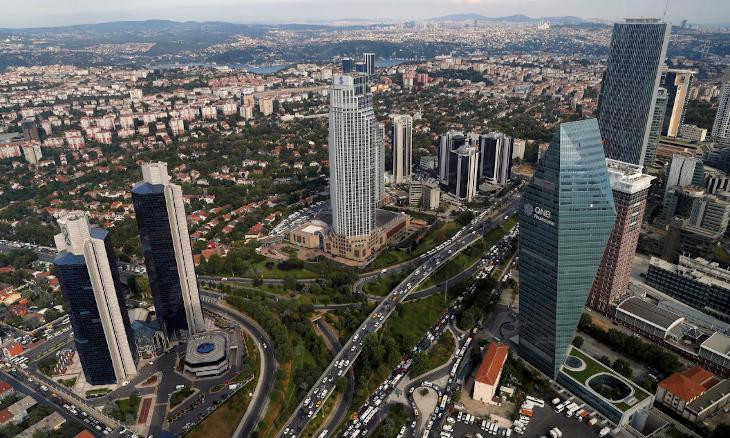Turkey cannot afford to handle COVID-19 crisis without external borrowing, study says
Turkey is in dire need of a source of external funding granted through a credible international institution in order to combat the economic impact of the coronavirus, according to a research of five Turkish economists. The study said that although a swap agreement with the U.S. Federal Reserve as well as the IMF could help Ankara to battle the crisis, the arrangement of a swap line alone would likely be insufficient.
Duvar English
Turkey's current fiscal and monetary measures to support the economy are not sufficient to compensate for the economic collapse of the coronavirus, and the country needs an “external anchor” to combat the impact of the virus, according to a newly released research paper penned by five Turkish economists.
 IMF anticipates Turkey's economy to shrink 5 percent in 2020
IMF anticipates Turkey's economy to shrink 5 percent in 2020Theresearch titled “COVID-19 and Emerging Markets: The Case of Turkey”said that although the Turkish Central Bank can print money or buygovernment bonds to deal with the crisis, it needs to convince themarket participants that such a method will not turn intoinflationary debt monetization. However, the current implementationin Turkey is not “transparent” and therefore has the risk ofbackfiring in hyperinflation, it said.
Turkey’s economy is facing a second recession in less than two years due to the COVID-19 disease pandemic, after having emerged from the first one in the second half of 2019.
“An opaque QE ['quantitative easing' program] that merely inflates the monetary base without explaining the calendar through which government bonds are purchased and where the money is spent would most likely backfire and risk inflationary pressures and excessive currency depreciation. Unfortunately, the current policy implementation in Turkey very much resembles our definition of an opaque QE and it is worrisome,” said the economists from Koç University in Istanbul and the University of Maryland.
 IMF: Turkey has not applied for emergency assistance amid coronavirus
IMF: Turkey has not applied for emergency assistance amid coronavirusThe academics however said that Turkey managed to successfully overcome the economic crisis of 2001, during which the Central Bank ran “a targeted and transparent asset purchase program,” accompanied by funding provided by the IMF.
“Weemphasize the importance of an external anchor. Successful monetaryfinancing/debt monetization requires policy credibility to keepinflation expectations under control. With rising risk premium andexternal borrowing costs due to COVID-19 shock and the existing lowlevels of policy credibility, Turkey cannot afford to do monetaryfinancing/financial repression without an external anchor,” itsaid.
“We provide a historical example from the 2002 IMF program instituted after the triple crisis of 2001, where Turkey did debt monetization together with a successful disinflation program, obtaining external finance at the same time.”
 Turkey held talks with U.S. over possible Fed swap line: Turkish officials
Turkey held talks with U.S. over possible Fed swap line: Turkish officialsThe academics said that although a swap agreement with the U.S. Federal Reserve as well as the IMF could help Ankara battle the crisis, the arrangement of a swap line alone would likely be insufficient.
"The average emergency swap agreement granted by the IMF is about $11bn, and the total outstanding amount granted by the Federal Reserve’s international swap lines is $18.9 bn as of April 14. These numbers imply that the arrangement of a swap line alone would likely be insufficient and should be accompanied by a more sizable international arrangement and monetary financing by the central bank," it said.
Turkey says it is also in talks with the United States about trying to secure a swap line from the U.S. Federal Reserve. Ankara is keen to secure funding from the U.S. Central Bank if possible, as it is not considering pursing a deal with the IMF.
 Turkish economy to shrink for first time in a decade this year: Poll
Turkish economy to shrink for first time in a decade this year: PollIn April, President Recep Tayyip Erdoğan said in an address to the nation that Turkey “will not bow down to the IMF program, or any imposition that would indebt our country.”
Many analysts say that the rejection of the IMF is political for Erdoğan, but they describe it as economically unsound, emphasizing that Ankara needs any kind of resources it can get.
Turkey's $15.4-bln relief package 'not sufficient to offset damages'
The study also said that the Turkish government's economic package worth $15.4 billion (100 billion Turkish Liras) is not sufficient to cushion the economic effects of COVID-19 and that Turkey has one of the smallest relief packages among the G-20 countries.
“Our estimates highlight that the current 100 bn TL stimulus package that is about 3.5 percent of the GDP is insufficient given the costs of the pandemic that is about 4.5 percent of the GDP under the most cost effective full lockdown scenario (which more than doubles when we consider partial lockdown scenarios),” the paper said.
“Aswe have shown earlier, among the G20 countries Turkey has one of thesmallest relief packages.Clearly, policy accommodation should beexpanded substantially in Turkey.”
The average size of the fiscal stimulus is about 10 percent among theG20 countries, with Germany leading the pack with 32 percent, thepaper said. “It is clear that the Turkish package is small, laggingbehind 16 of the G20 countries.”
“Oneof the main components that is missing in the package is the absenceof direct transfer payments to those who have lost their jobs orexperienced interruptions in their income streams due to thepandemic, especially to SMEs who constitute the back-bone of theTurkish economy. If the lost income and salaries are not replaced bythe government, it is impossible to keep the wheels of the economyturning.”
Study suggests full lockdown would limit economic damage
The preliminary findings in the paper suggest an immediate “full lockdown” would better insulate the economy rather than the currently implemented partial lockdown.
“Our estimates show that the lowest economic cost, which saves the maximum number of lives, can be achieved under an immediate full lockdown. Partial lockdowns, which is the current policy, amplify the economic toll because the normalization takes longer,” the research said.
The research thereby concluded that if a second wave of the COVID-19 virus hits, then an immediate full lockdown would work in the most effective way.
The research paper was authored by Selva Demiralp, Cem Çakmaklı, Sevcan Yeşiltaş and Muhammed Ali Yıldırım from Koç University and Şebnem Kalemli-Özcan from University of Maryland.
